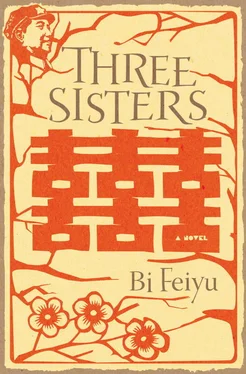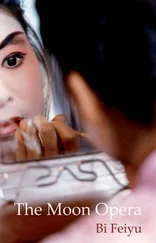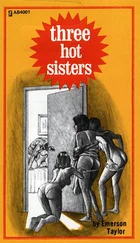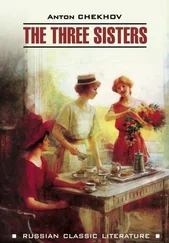Not knowing what else to say, they sat quietly, trying to think of something to talk about. And that created an atmosphere of nervous tension. They weren’t, of course, really nervous. These were unusual circumstances; they both felt a desire to do something, yet dared not take another step, for that would be crossing a line. Saying that a warm, tender feeling filled their hearts better describes the moment.
Avoiding Fenghua’s eyes, the teacher focused on the red hairclip. “I see you like red,” he said with a smile. Fenghua lowered her head and concentrated on rubbing her hands.
“Red really isn’t a good color,” he said.
Without looking up, she batted her eyes and said, “And why is that? You have to take responsibility for what you say.”
His chest heaved with a silent laugh. “For something like that? What responsibility do you expect me to take?”
“If the girls in my class say I’m not pretty, I’ll come looking for you.”
Surprised that she had the nerve to say that, he had to laugh. “I meant red isn’t a good color for you.”
“Why not?”
“It just isn’t.”
Fenghua looked up and glared at him, pointing with her chin. With her eyes fixed on his face, she blurted out harshly, “Bullshit.”
Panic-stricken at her outburst, she quickly covered her mouth, but was surprised to see that he was not offended. On the contrary, he appeared to like the way she talked; his smile seemed to indicate that he was glad to hear that kind of talk from her. She could tell that the word brought him unexpected happiness. People often forget themselves when they’re happy, and the teacher was no exception.
“What did you just say?” he asked softly. “Say it again.”
Emboldened by what he must be thinking, Fenghua leaned forward and replied in an even softer voice, “Bullshit. You’re full of shit.” Her voice was so soft that she seemed to be only mouthing the words.
He reacted to the unique whisper by smiling and saying in a honeyed voice, “Be careful, or I might sew your mouth shut.”
Falling out of love is the same as falling ill, and Yuyang’s illness was a serious one. She was weak and lethargic. Everyone in her class was elated over winning the singing contest, but their euphoria only made her more aware of her own insignificance and inferiority—yet another kind of humiliation. Preoccupied over her disappointment in love and the pain of that humiliation, she had completely forgotten an important task—she hadn’t sent a written report to Teacher Wei for two weeks in a row. His displeasure and anger were clearly on display when he pulled the curtain shut after calling her into the duty office. He got right to the point by giving an accurate diagnosis of Yuyang’s problem before asking her to talk about it: She was dispirited and her thinking must have been contaminated by something unhealthy.
As she sat across from her teacher, she felt ashamed and terrified, aware that he’d seen through her, so she looked down at her feet and held her tongue. In fact, she had been watchful since the day she had met Chu Tian, and had cautioned and castigated herself, but to no avail. Unable to control herself, she’d fallen in love with a young hooligan. The results would have been devastating if Chu Tian hadn’t destroyed himself in her eyes, if he hadn’t exposed his hooligan nature.
After being silent for as long as it took Wei to smoke half a cigarette, Yuyang finally shed tears of remorse and courageously looked up at the teacher. “I’ll tell you everything,” she said through her tears.
Wei Xiangdong took swift and decisive action. Eleven minutes later, Gao Honghai, alias Chu Tian, was standing in Wei’s duty office, where he was told to take the “three-against” position—pressing his nose, his belly, and his toes against the wall. While he was flattened up against the wall, he was told to trace the shameful course of his inner journey as a means of “exposing” his problems. Think, and think hard. The three-against punishment lasted forty-five minutes, which meant that Gao told on himself for three quarters of an hour, after which he was ordered to turn around. Wei then switched on all the lights in the office and brought over a desk lamp to shine in Gao’s face; a round patch of lime on his nose made him look like a Peking Opera clown.
“Have you thought through everything?” Wei asked. Gao kept quiet and began to wet himself, drenching his shoes and making a puddle on the floor.
“Have you thought through everything?” Wei repeated.
“Yes,” Gao responded softly.
“Then talk.”
So Gao talked, telling a shocking story. Stripped of the façade of a poet, he exposed his filthy and sordid inner world, for he was “in love” with eight girls at the same time: Wang Qin, Li Dongmei, Gao Zijuan, Cong Zhongxiao, Chan Xia, Tong Zhen, Lin Aifen, and Qu Meixi. Every night after lights-out, he confessed, he began to think about them one by one.
He even had poetry as proof.
Your long hair flying in the wind is the darkness in my heart
Intoxicating me in a dream I savor while we’re apart
I want to touch in the distance only your back
You’re my little bird you’re my butterfly
Oh splashing rain my tears to start
This one was dedicated to Li Dongmei. With his eyes fixed on Gao, Wei breathed hard, but that went unnoticed by Gao, who was drunk on his own poetry. His eyes grew misty as he worked himself up to give another example, a poem to Qu Meixi.
I’m lost
Oh I’m lost
In the distant stream
You are the bride of my dream
I want to get closer and closer to you but you hide from me
I can only scream
Gao recited another poem and then another, clearly self-satisfied and completely unaware of the menacing look on Wei’s face. With his eyes fixed on Gao, Wei felt his anger mount until he slammed his fist on the desk and shouted, “No more rhymes. Stop it. Just talk.”
Gao’s recital came to an abrupt end as he hunched his shoulders. Then he slowly relaxed and wordlessly looked at Wei, as if in a daze.
The following morning Gao did something utterly shocking in his classical essay class when the teacher was explicating Su Dongpo’s “Red Cliff Lament.” The teacher, a man in his fifties, spoke with a southern accent that made his “n” indistinguishable from his “l,” and his “zh,” “ch,” and “sh” indistinguishable from his “z,” “c,” and “s.”
He had a high-pitched voice that tended to turn shrill when he was excited, giving it a soaring quality and himself a self-indulgent air. His eyes emitted searing heat from behind his glasses. In order to explicate the line “When he first married the younger sister Qiao, he showed a resounding air of gallantry,” he began to cite allusions that would involve the phrase “If the east wind brought Zhou Yu no aid.”
He turned around to write “The two Qiao sisters would be locked up in Tongque Terrace in late spring” on the blackboard when Gao Honghai stood up and commanded in a severe voice, “No rhymes.”
The teacher spun around and asked cautiously, “What did you say?”
To everyone’s surprise, Gao slammed his fist on the desk and shouted in a voice that seemed to have the power to swallow the world, “No rhymes!”
Taken by surprise, the teacher suppressed his anger and said patiently, “Comrade Chu Tian, you write free verse, so you don’t have to rhyme, but classical poetry is different. This is not a question of whether you can or cannot; it’s a matter of the formulaic structure and rules of classical prosody. Understand? You have to rhyme.”
Enraged, Gao Honghai insisted stubbornly, “No rhymes!”
Unreasonable, disrespectful, disruptive. The aggrieved teacher froze. Fortunately, the bell rang, which gave him a chance to voice his anger in the way he announced “Class dismissed.” He picked up his notes, but Gao would not give up. Growing fixated on the teacher, Gao repeated the command over and over.
Читать дальше











